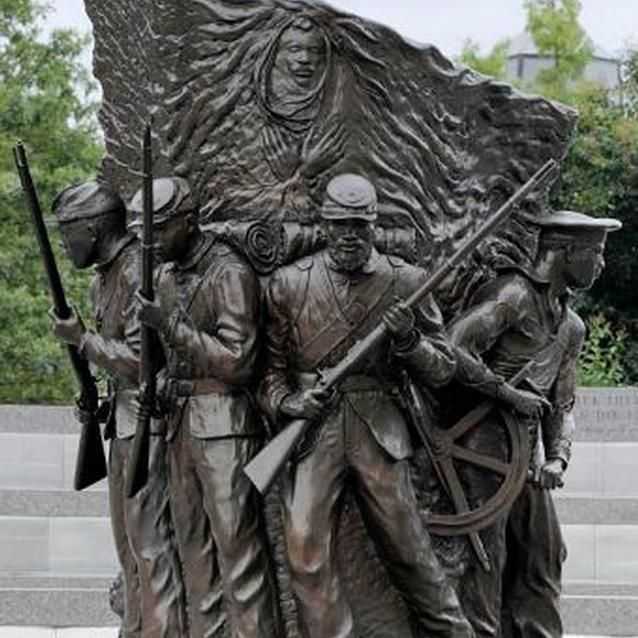What Was the Battle Called That Gave Lincoln His Opportunity to Issue the Proclamation?
Freedom At Antietam
Every bit the glowing sun fix over the bloody fields of Antietam, the Ceremonious War became a dissimilar war. 5 days after the battle, armed with pen and paper, Abraham Lincoln changed the war when he issued the Emancipation Proclamation.
"...all persons held equally slaves within any State...the people whereof shall then be in rebellion against the United States, shall exist then, thenceforward, and forever free." Emancipation Announcement, January 1, 1863
The announcement reflected Lincoln's new mode of thinking about the conflict. Until this time, it was seen every bit a rebellion, a fight to preserve the Wedlock without touching slavery. At present Lincoln was threatening to crush the Confederacy past destroying slavery, the ground of its economic system and society. At present the North was waging a moral cause to gratis the slaves.
While the Emancipation Proclamation reflected Lincoln's loftier-minded morality, the president was nether not bad pressure to human activity. Congress was urging emancipation. Escaped slaves were fleeing to the Union regular army every bit information technology advanced in the South, complicating armed services operations. And the enlistment of black Americans as soldiers could give the Union's bilious armed forces a much-needed boost.
Forever Free, Only When?
Lincoln's preliminary announcement, issued on September 22, 1862, declared that on New year, 1863, slaves in areas and then "in rebellion against the Us shall be then, thenceforward, and forever free." For areas not deemed to be in rebellion, slavery would be unchanged.
The terminal proclamation, issued January one, 1863, identified those areas "in rebellion." They included virtually the unabridged Confederacy, except areas controlled by the Matrimony army. The document notably excluded the so-called border states of Maryland, Kentucky, and Missouri, where slavery existed side by side with Unionist sentiment. In areas where the U.South. authorities had authority, such equally Maryland and much of Tennessee, slavery went untouched. In areas where slaves were declared free - nigh of the South - the federal government had no constructive authority.
By the summer of 1862, Congress was pushing hard for emancipation. Now Lincoln's announcement, a vital step on the gradual path to freedom for American slaves, articulated emancipation as the government's new policy.
Although his famous annunciation did not immediately complimentary a single slave, black Americans saw Lincoln as a savior. Official legal freedom for the slaves came in December 1865 with the ratification of the 13th Amendment to the Constitution, which abolished slavery
Political Tightrope
Like everything else in Lincoln'southward assistants, the slavery issue was fraught with political pitfalls. On ane hand, Lincoln was under pressure from Congress and some of his ain generals to attack slavery.
But Lincoln was appreciative to the Union edge states of Maryland, Kentucky and Missouri, where some slave owners were loyal Marriage men. Lincoln was afraid to seize their private property (their slaves) and lose those states to the Confederacy, so he exempted them from his Emancipation Proclamation.
The timing of the proclamation was likewise political. Lincoln penned his first copy in July 1862, when Union armies were losing one boxing after some other. Merely Secretarial assistant of Country William Seward persuaded Lincoln that emancipation and so would expect like the "concluding measure of an exhausted authorities . . . stretching along its hands to . . . Ethiopia, instead of Ethiopia stretching forth her hands to the regime." (In the mid-19th century, black Americans were sometimes called Ethiopians.)
And so Lincoln decided to wait for a victory on the battlefield. Antietam gave him his opportunity.
Military Necessity

Carol G. Highsmith's America, Library of Congress, Prints and Photographs Division
Subsequently the announcement, Union troops became an regular army of liberation as they avant-garde in the South. During the war, ane out of every vii Amalgamated slaves (about 500,000) escaped to the Union army. The South was thus deprived of desperately needed labor to till fields, build forts and fix railroads.
The Emancipation Announcement also paved the way for the enlistment of blackness Americans as soldiers. During the summertime of 1862, as Lincoln pondered emancipation, the North was facing a shortage of soldiers. Lincoln fifty-fifty offered volunteers enlistments for only nine months instead of the usual three years, hoping that a shorter enlistment would concenter more recruits. Ane solution: enlist blackness Americans, whether gratis men from the Due north or freed slaves from the South.
Despite deep and widespread prejudice, the Wedlock began recruiting black Americans in hostage in early 1863. Believed to be physically and spiritually unfit as fighting men, they were initially bars to not-combat jobs. Nonetheless, African American soldiers proved their mettle on the battlefield. They distinguished themselves in May 1863 when they bravely attacked Port Hudson across open up ground on the Mississippi River in Louisiana. A calendar month later, blackness troops made another valiant accuse when they stormed Fort Wagner most Charleston, S.C. This famous attack was depicted in the motion picture "Glory."
About 186,000 African Americans served in the Union army, making upwards about nine percent of Federal forces. The North's reward in military manpower was a disquisitional factor in its victory in the Civil War. Some northerners supported Lincoln's measure out on moral grounds. But many endorsed emancipation because they favored any activeness that would help defeat the enemy and end the war.
Last updated: July 11, 2019
Source: https://www.nps.gov/articles/freedom-at-antietam.htm#:~:text=As%20the%20glowing%20sun%20set,he%20issued%20the%20Emancipation%20Proclamation.
0 Response to "What Was the Battle Called That Gave Lincoln His Opportunity to Issue the Proclamation?"
Postar um comentário